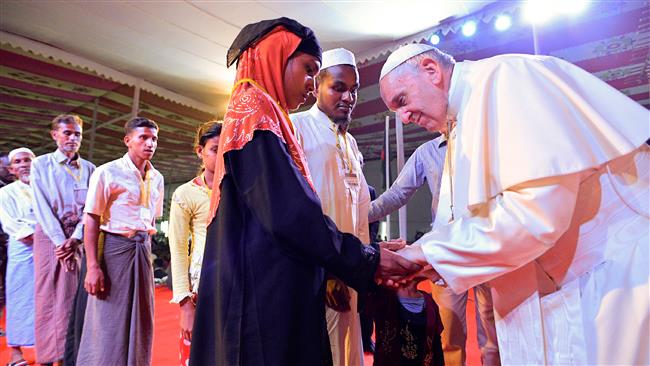
RNA - On the last leg of his Asian tour, the leader of the Roman Catholic Church visited a group of Rohingya Muslims at an inter-religious peace meeting in the Bangladeshi capital, Dhaka, on Friday.
“Your tragedy is very hard, very great, but it has a place in our hearts,” the pope said.
“In the name of all of those who have persecuted you, hurt you, especially the indifference in the world. I ask for forgiveness, forgiveness,” he added. “Now I appeal to your large hearts to give us the forgiveness that we are asking.”
Using the word Rohingya for the first time on the trip, the pontiff called for the ethnic minority to be respected and said, “The presence of God today also is called Rohingya.”
During his papal visit to Myanmar last week, the pope avoided any direct reference to the Rohingya in public while appealing to Buddhist leaders to overcome “prejudice and hatred.”
In the run-up to the tour, Pope had been advised by leading figures in the Catholic Church and international politics not to use the word “Rohingya” due to political sensitivities.
He was, however, under pressure by human rights groups to stand up for the world’s most persecuted minority community by using their ethnic name.
Pope Francis, who is known for defending the rights of refugees, has on various occasions expressed his support for the Rohingya Muslims fleeing to Bangladesh from the violence in Myanmar.
Earlier this year, the pontiff spoke of “the persecution of our Rohingya brothers and sisters” and defended their right to “live their culture and Muslim faith.”
During the encounter in Dhaka, the refugee group, which included 12 men and four women, including two young girls, recounted their ordeal through interpreters and said scores of Rohingya villages had been burnt to the ground, people killed and women raped, with the pontiff looking pained as he listened.
More than 600,000 Rohingya Muslims have sought sanctuary in Bangladesh after the military in mostly Buddhist Myanmar launched a crackdown campaign in their villages across the northern parts of Rakhine State on August 25, using a number of armed attacks on security checkpoints as a pretext.
Myanmar’s officials use the term “Bengali” for the Rohingya. The group, which has lived in Myanmar for decades, has been denied citizenship in both Myanmar and neighboring Bangladesh.
During the past three months, government troops, apart from raping, have been committing killings, making arbitrary arrests, and carrying out mass arson of houses in hundreds of predominantly-Rohingya villages in the restive state.
The UN has already described the Rohingya as the most persecuted community in the world, calling the situation in Rakhine similar to “a textbook example of ethnic cleansing.”
Rights groups say Myanmar's treatment of the Rohingya constitutes crime against humanity.
Prominent human rights groups have recently called on international agencies to monitor the safe return of Rohingya Muslims to Myanmar, with estimates as to how many Muslims have been killed varying from 1,000 to 3,000.
847/940